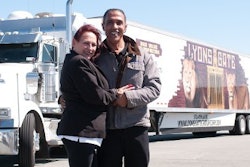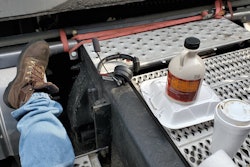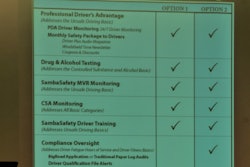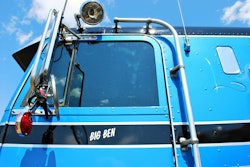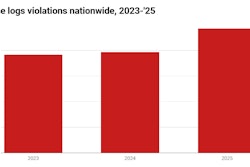A recent online symposium delved into driver fatigue, revealing some things known all too well and others that aren’t so obvious.
One speaker was longtime driver/former owner-operator Bill Hambrick, who’s now with Werner Enterprises and is part of the American Trucking Associations’ driver-ambassadors group, America’s Road Team. The event was hosted by the National Transportation Safety Board, the body often tasked with investigating major accidents. The topics included fatigue science and, as Hambrick made clear, what might be done to manage fatigue to prevent it from catching you off-guard.
Hambrick recognized the deck that’s long been stacked against drivers in their pursuit of adequate rest: a logistics culture that sometimes values timeliness above nearly everything else when it comes to the most important link in any supply chain (that’s you). Here’s how he very succinctly put it:
Upon pickup and delivery, much too often, the only communication received by the driver is “Why are you late?”
Hambrick said “safety is everyone’s responsibility,” not just the driver’s. More support (he gracefully implied, in my view) from shippers and receivers, from brokers, from carrier personnel up and down the chain, from the researchers and investigators at NTSB, would be greatly appreciated.

What safety manager types call a “fatigue management program” might be one way for small fleets to formally do that. A well-designed program contains not only information regularly conveyed but explicit agreement, regularly reinforced, of shared safety values. At many a small fleet, this happens simply by default, given the nature of the business. My colleague Tom Quimby, who covered the NTSB session more broadly, has a little more in depth on working out an effective program in part via some examples at larger carriers. See this at Overdrive’s sister publication CCJ.
For those like Hambrick who haul full-time, safety is built into everything you do. Yet with so much freight still under an hours-exempt status (through December 31) given the supply chain stress of the COVID-19 pandemic, and with freight rates way up for many, the attitude that Hambrick diagnosed at customers is bound to rear its head.
Jana Price, an investigator at NTSB, focused on an individual’s limitations when it comes to assessing fatigue. She shared a graph that illustrates a subtle phenomenon worth keeping in mind when the pressure comes.
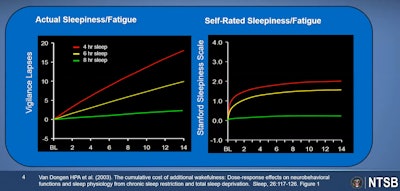 On the left are results of tests measuring responses to various stimuli in people over time who’d consistently slept just four, six or eight hours (top, middle and bottom graphed lines for those of you reading on mobile). On the right is the level of fatigue reported by those same people over the same time. The upshot: Performance gets worse pretty well every day, particularly for those sleeping only six or four hours. Yet over the same time period the perception of tiredness, after a quick jump the first day of less sleep, quickly adjusts to a kind of normal as the brain plays a kind of trick.
On the left are results of tests measuring responses to various stimuli in people over time who’d consistently slept just four, six or eight hours (top, middle and bottom graphed lines for those of you reading on mobile). On the right is the level of fatigue reported by those same people over the same time. The upshot: Performance gets worse pretty well every day, particularly for those sleeping only six or four hours. Yet over the same time period the perception of tiredness, after a quick jump the first day of less sleep, quickly adjusts to a kind of normal as the brain plays a kind of trick.Without adequate sleep, “your performance gets progressively worse over time,” Price said. “Your ability to stay vigilant, to do the driving task, and be able to react to stimulus around you gets worse.”
Yet you may feel as if nothing is changing as your perception of your fatigue adjusts. In the study referenced above, participants’ “self-reports of their sleepiness, however, flatlined” even as actual performance got worse. “If you go multiple days having less-than-optimal sleep, you may feel like things haven’t changed, but in reality your performance will continue to decline.”
Perhaps this isn’t news to you, or perhaps you’re keenly aware of being vulnerable to self-deception. Either way, take it as a reminder in this time when stressors and pressure — from within and without — are high for many.
‘Joy Ride’ to the Port of Savannah, $5/mile van freight, and …
Speaking of supply-chain irregularities, owner-operator Ben Cadle of Augusta, Ga.-based Cadle Trucking, spent a couple days doing something especially rare for his mostly flatbed/step-deck business. He runs a 12-driver (including himself) fleet leased to Bennett Motor Express and also serves as an agent for the company.
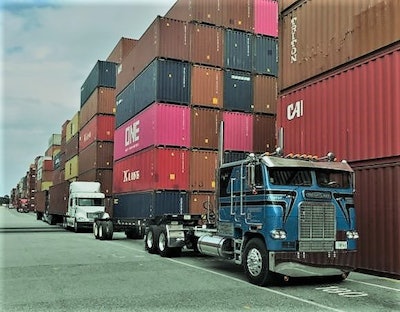 That’s Cadle’s “Joy Ride 3” 1982 Freightliner cabover at the Port of Savannah early this week, working a train derailment not far from his Augusta home base. While cabovers are no strange sight at the port, “people were hollering on the CB,” Cadle said, “honking their horns and everything.” Three people asked him would he sell it. You can hear more of the story of how the custom-restored rig came to be via this video from 2017.
That’s Cadle’s “Joy Ride 3” 1982 Freightliner cabover at the Port of Savannah early this week, working a train derailment not far from his Augusta home base. While cabovers are no strange sight at the port, “people were hollering on the CB,” Cadle said, “honking their horns and everything.” Three people asked him would he sell it. You can hear more of the story of how the custom-restored rig came to be via this video from 2017.Cadle got a call about a train derailment in his relative area from a customer and put to work a couple container chassis he’d had for sale and/or rent via his own Trelco Trailers business. He even subsequently “bought a new one,” he said, toward the end of the few days he spent shuttling containers from the derailment to the port — that one was a 45-footer he “figured I’d rent if I need to.”
And he may well hang on to the other two, too. “Those trains are going to derail sooner or later. When it rains hard it washes the tracks out” between Augusta and Savannah often enough, he said. “I don’t wish any bad luck on anybody, but work’s work.”
Speaking of work, the pandemic-driven boost in online commerce broadly has put such a premium on van freight that Cadle’s own van-freight contracts with shippers, a small minority of his business, he describes as essentially obsolete. If he can’t cover those runs when they arise with his own trucks, he’s felt lately like he can pretty much forget about covering them within the wider in-company network of agents and owner-ops.
A friend on the West Coast told him owner-operators are coming out of California as high as $5 a mile. “Who’s ever heard of $5 a mile freight coming out of California in a van?” he said. “If I was in the van business, I’d be knocking it down. If you’re in vans and you’re not making money now, you’ll never make it.”
Yet Cadle is in vans, of a fashion. Or was. He picked up 60 used vans of various vintages to sell or rent via his Trelco business just as the pandemic was getting going. “I sold them in two months,” he said, then “ordered five new ones and pre-sold them. The van market has gone through the roof.”
A new gig via another Bennett agent, too, he said, will put two trucks on a lane between Augusta and Atlanta pulling doubles and triples supporting the “holiday shopping season and [e-commerce generally] combined. The rates are pretty good on it, and it’s dedicated. I can count on that money. I thought, ‘Heck, I’ll stick two trucks on it and see what happens. My guys have doubles and triples on their licenses.”
And, he added: “The truck doesn’t discriminate. That fifth wheel doesn’t care what you hook it to.”

